Does God Exist On Stage? Theater and Religion
There are 10,000 religions in the world right now, although half the world’s population is “Abrahamic” (“either Jewish or Christian or Islamic”), Baba Brinkman tells us in The Rap Guide to Religion. His solo show at the SoHo Playhouse is one of a number of current works of theater in New York that touch upon religion, although with very different approaches: Some ridicule organized religion; others reflect specific doctrines, or try to reproduce the awe felt by believers; still others focus on characters engaged in some kind of internal struggle.
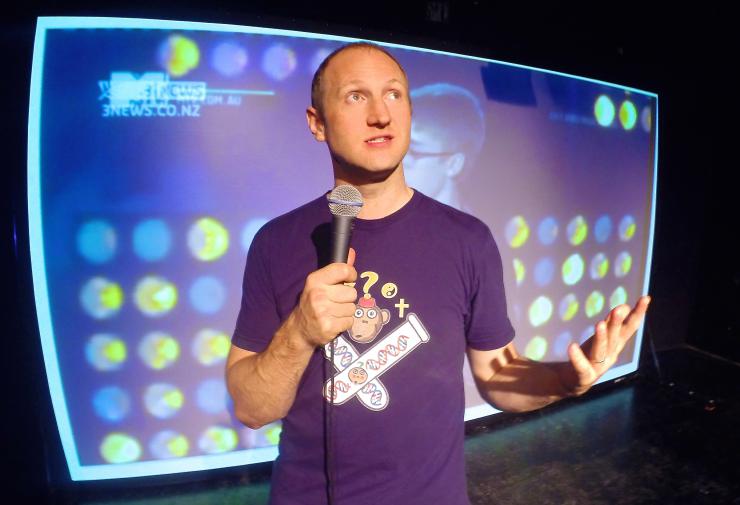
Brinkman uses humor, but not in mockery. He mentions specific faiths but only in passing. The awe he feels seems mostly for rap music. His is essentially a serious scientific, albeit rhythmic, inquiry into the nature of religion. Studies have shown, Brinkman tells us for example, that the more miserable you are, the more likely you are to be religious, although it’s not clear whether “suffering is causing religion or vice versa.” Other studies indicate that the more often you go to “your church, temple, mosque, whatever,” the more children you have—which suggests an evolutionary benefit to religion.
How would all his fascinating information go down with the religiously observant? In his opening rap, Brinkman acknowledges:
No way to please both believers and heathens
Try to at least offend for the right reasons
It’s clear that Brinkman puts himself in the heathen camp:
Judging by the atheistic, peaceful, democratic, and socially egalitarian areas of the world, especially Western Europe, civil institutions can protect us from exploitation just as well as religion if not better, and without the need for bizarre beliefs and rituals.
But both during the show, and in a talkback afterwards, he recognizes how intertwined religion and theater have been. “Throughout history,” he says during the show, “religious beliefs have been communicated through song and story, poetry, and verse.” He doesn’t mention (and doesn’t have to) that theater began as an integral part of religion; the plays by the Greek dramatists were written for holy festivals.
So why in fields that are both devoted to awe and transport, does the norm seem to be an unspoken separation between church and stage?
In the talkback after the Rap Guide to Religion, which is Brinkman’s sixth “rap guide” (others have been to evolution, to the wilderness, to “the neuroscience of improv”), the rapper explained that he was drawn to the subject of religion because of its pageantry. “I wanted to evoke those moments,” he says.
His guest at the talkback was NYU professor Jonathan Haidt, author of The Righteous Mind: Why Good People are Divided by Politics and Religion. “Art and religion share the psychological state of transportation—being transported,” Haidt said. “We all love being taken out of ourselves, temporarily.”
So why in fields that are both devoted to awe and transport, does the norm seem to be an unspoken separation between church and stage?
Could this be exactly because of their similarities? Could the theater offer to both theater artists and theatergoers a kind of substitute for the awe they felt as children towards a religion that they no longer can as readily accept intellectually or morally?
That’s how Scottish theater critic Mark Fisher sees it: “There are a lot of ex-observant artists seeking to find the equivalent sensations. But drama thrives on ambiguity.”
A good example may be playwright Marsha Norman, who in a recent interview, talked at length about her faith: She grew up “trapped in an Evangelical hotspot” and remains greatly influenced by Bible stories, but now embraces a “personal faith” that seems to have no room for organized religion. “I’m not concerned with is there a God or isn’t there a God, but I’m concerned with the trials people face and how they get through them.”
This doesn’t necessarily mean that a person who works in the theater is less likely (or more likely) to be religious than the average person in their community. What’s intriguing is not so much the individuals’ private beliefs, but the way religion plays out publically on New York stages.
Marsha Norman said in a recent interview ‘I'm not concerned with is there a God or isn’t there a God, but I’m concerned with the trials people face and how they get through them.’
Ridiculing Religion, Worshipping Theater
The Book of Mormon, which focuses on two young Mormon’s mission to Africa, famously mocks organized religion as a whole, and singles out the Church of Jesus Christ Of Latter Day Saints, highlighting the church’s past history of racism, and what the musical’s creative team see as its odd beliefs.
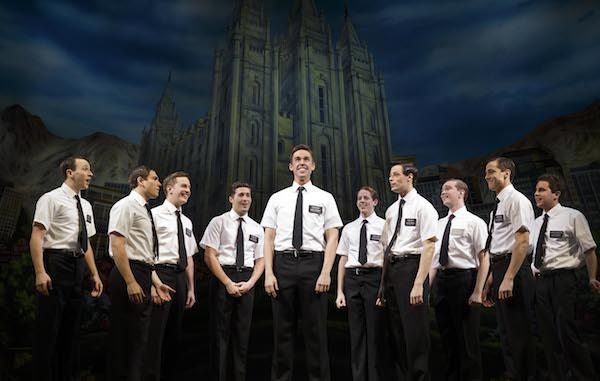
Almost four years after it opened, this musical remains one of the hottest tickets on Broadway, while more faith-affirming shows have flopped miserably—one thinks of Alan Menken’s Leap of Faith, or Scandalous, Kathie Lee Gifford’s ode to evangelist Aimee Semple McPherson.
But, some will protest, The Book of Mormon is funny, and tuneful, and smart about musical theater, while Scandalous was…not. So it may be a coincidence. But it may not be a complete stretch to point out, as I did in my original review, that The Book of Mormon is “worshipping at the altar of The Great White Way”—borrowing, ribbing, and paying homage to such landmark Broadway musicals as The King and I and The Lion King, with The Music Man and How to Succeed in Business Without Really Trying thrown in. When at the end, the musical acknowledges in a clever way the human need for the spiritual, audiences can be forgiven for getting the message that it’s musical theater that can supply it.
Internal Struggles
In the bluntly provocative Disgraced, playwright Ayad Akhtar examines his sophisticated New York characters’ varying reactions to Islam, slyly putting much of the anti-Islamic sentiment in Amir, the son of Pakistani immigrants, who grew up Muslim and now sees himself as an assimilated affluent attorney living on the Upper East Side with his blonde American wife, Emily. The defense of Islam rests largely with Emily (who’s a Christian), a painter inspired by Islamic art, as well as with Isaac, Emily’s (Jewish) art dealer, who makes a distinction between Islam and what he calls Islamo-fascism.
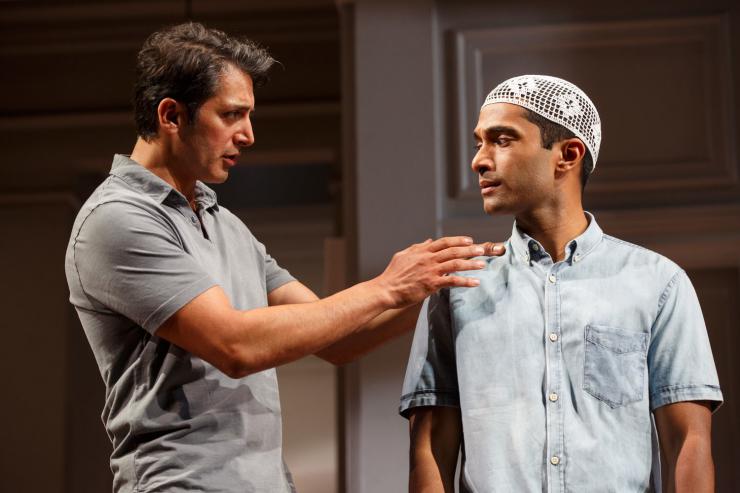
If the issues here are primarily political, Amir directly attacks the religion itself, citing heinous passages in the Koran.
Amir does not seem to serve as a straightforward mouthpiece for the author, since the character’s actions and attitudes are confused and self-contradictory, at one point admitting to feeling pride at the events of September 11th.
“You’re an American,” says Jory, Isaac’s (African American) wife. “It’s tribal, Jor. It is in the bones,” Amir answers. “You have no idea how I was brought up. You have to work real hard to root that shit out.”
The main character has no such hostility to her religion in Grand Concourse, a play by Heidi Schreck that was at Playwrights Horizons last month, though she ultimately engages in a losing struggle with it. Sister Shelley, a nun in charge of a soup kitchen in the Bronx, eschews a nun’s habit and is so unsure of her faith that she turns on the timer to the microwave to force herself to pray for a set number of minutes per day. Emma, a college dropout, visits the kitchen, seeking guidance and offering to help out with cooking—talk to a priest, Shelly advises.
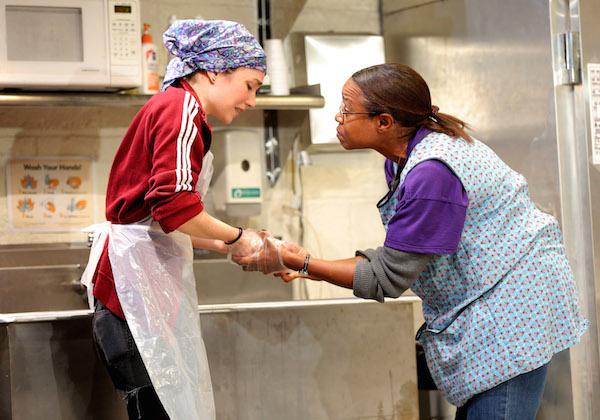
Much of the action of the play involves the interaction of Emma with Shelley and other members of the small family that has developed in the soup kitchen, a single sometimes-homeless customer named Frog, and the janitor and security guard Oscar. Emma turns out to be unreliable to the point of being reckless, and she neglects to take care of Shelley’s cat while the nun visits her dying father in California, with disastrous consequences.
The result is that Shelley quits being a nun. “It was a decision I would have come to, eventually, though your actions were clarifying,” Shelley tells Emma. Perhaps I missed some cues, but they weren’t clarifying to me—her decision seems mysterious, but perhaps that’s the point?
Suspension of Disbelief (Commencement of Belief)
Although they both deal with Catholic characters, Katori Hall’s Our Lady of Kibeho at the Signature Theatre, offers an almost complete contrast to Grand Concourse. The play is based on the true story of three church schoolgirls in Rwanda in the 1980s who reported seeing an apparition of the Virgin Mary. The Church eventually affirmed the authenticity of this miracle, determining that the Virgin Mary had visited the girls to warn them of the bloodshed to come; Kibeho was one of the sites of the genocide that occurred in 1994. While director Kip Fagan’s production of Grand Concourse was literal and precise, down to the chopped carrots and the boiling pot of soup, in Our Lady of Kibeho Michael Greif presents an impressionistic and mystical world, with stage effects—dark dramatic lighting, swirling video projections, beds lifting in the air—intended to induce a sense of the miraculous and of spiritual wonder.
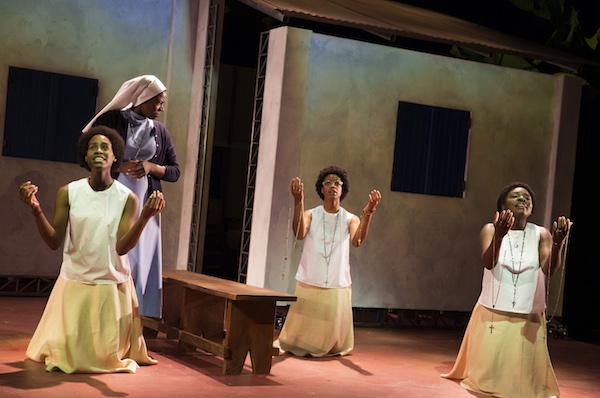
In this way, it bears greatest resemblance to The Oldest Boy by Sarah Ruhl at Lincoln Center, which is reportedly also inspired by a true story: An American mother who has married an immigrant Tibetan chef, is visited one day by two Buddhist monks. They tell her that her three-year-old son is the reincarnation of a revered Tibetan Lama, and they ask her whether she would be willing to give him up so that he can be raised in a monastery in India.
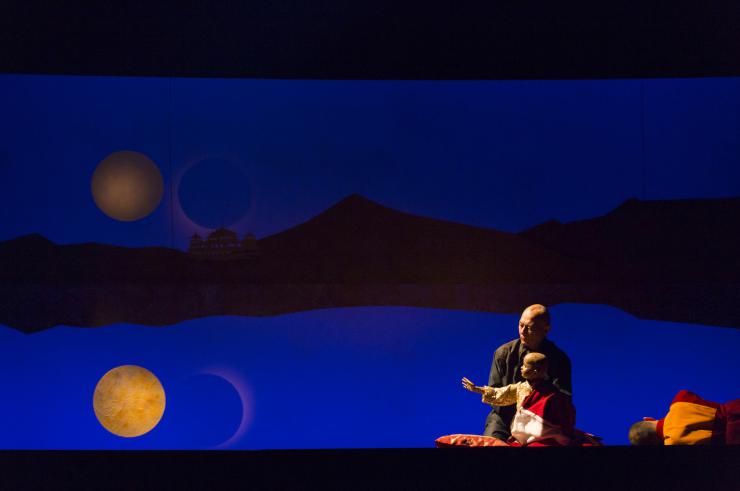
As with Our Lady of Kibeho, the stagecraft of The Oldest Boy is breathtaking. The backdrop of sunsets, the use of puppetry (the reincarnated toddler is portrayed by a marionette), the ornate costumes, and the gentle music instill a sense of awe and calm, and add up to a nearly hypnotic effect.
The miracles in The Oldest Boy and Our Lady of Kibeho are not up for debate or much interpretation—the audience is directly presented various demonstrations of the truth of the Kibeho students’ visions and of the Tibetan-American boy’s reincarnation. To me, the miraculous moments felt force-fed, as if I had stayed too long at a church (or temple) to which I do not belong. Let me admit that this was my limitation as a theatergoer.
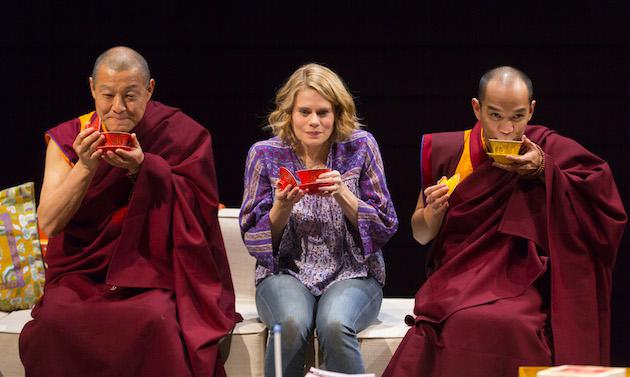
I have no evidence that either playwright was directly proselytizing for their faith (I doubt that they even share the religion of their characters), and many others were capable of a suspension of disbelief; Our Lady of Kibeho made a couple of critics’ top 10 lists for 2014.
A comment from a reader of my review makes an important point:
How often as a person of faith have I watched films and theater that assumed lack of belief? Is it so hard when it goes the other way? This review makes me eager to see this play, which dares to bring spirituality into the plot without marginalizing or mocking it.

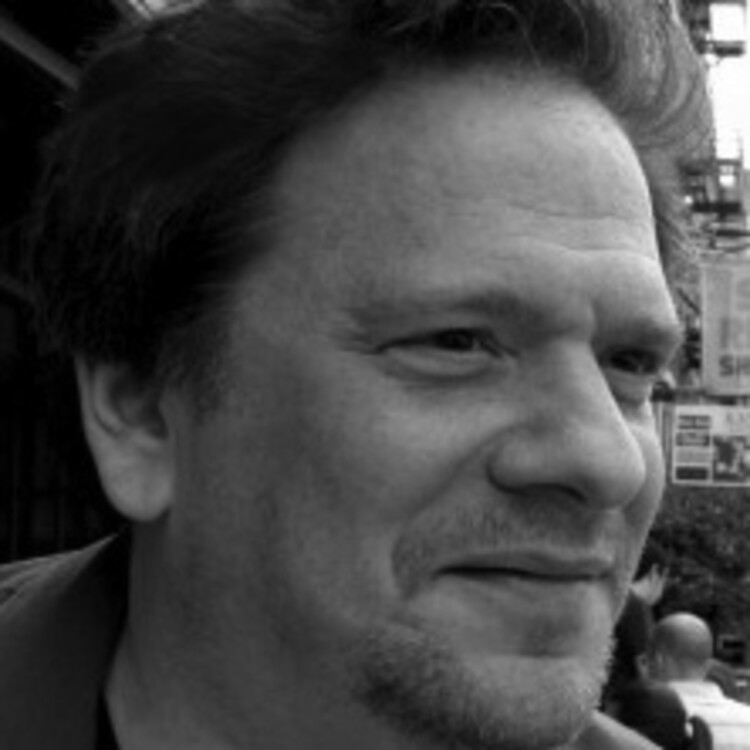
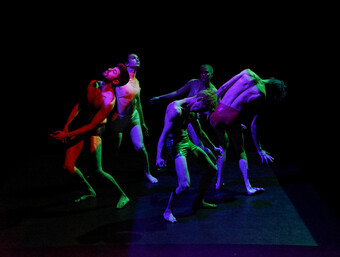


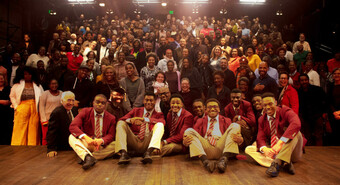

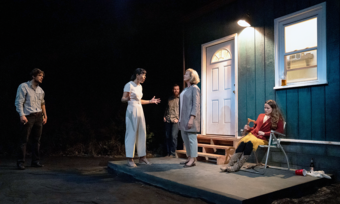


Comments
The article is just the start of the conversation—we want to know what you think about this subject, too! HowlRound is a space for knowledge-sharing, and we welcome spirited, thoughtful, and on-topic dialogue. Find our full comments policy here
I probably should have mentioned a show that, although no longer playing, was deeply connected to the subject at hand -- The Mysteries, at The Flea, a retelling of the Bible.
http://newyorktheater.me/20...
More precisely, it was a modern re-telling of the medieval Mystery plays. Over six hours 48 playwrights contributed new short plays adapting Bible stories. David Henry Hwang (M Butterfly) reworked the story of Cain and Abel. Jeff Whitty (Avenue Q) wrote about The Last Supper. Craig Lucas (Prelude to a Kiss, Light on the Piazza) contributed two plays, one of them about the Crucifixion.
Hello Jonathan and all who posted,
I just found, in my inbox, this article and the responses on St Stephens (Boxing) day, when people would traditionally give away goods and comforts. And this article, and the responses, was your gift to me and perhaps to all those who received it on Boxing day!
You talk about religion and transformation as played out in the theater. It reminds me of the magic of Shakespeare – the miracles enacted on stage, all of them to do with that one aspect of life that marches on and cannot be undone – time. We often long to go back again: to undo this or that stupid action, to avoid the tragedy that befell our family... Yet we can't. Time is irrevocable and implacable. I often feel that Shakespeare's plays - Lear, Twelfth Night, Othello – both underscore this unavoidable truth about human existence, while playing out the fantasies we long for - here IS my brother back again (I thought he was deceased and lived for so long with that loss); here IS the precious daughter back again (she has forgiven, she is back in her father's arms for a miraculous moment before his death); here IS the truth, in Othello's eyes, that is the final sum of his life (one who loved not wisely but too well - an image that, for the moment in which he speaks it, denies the brutal reality of his beloved wife, murdered by him and lifeless on the bed.) I guess this, for me, is the magic that is enacted on-stage - the miracles that we long for, and the miracles we are permitted to believe in. It doesn't matter if these miracles exist only for a moment. It makes them no less of a miracle.
I recognize that this article focuses on
religion on stage but I also wonder about the transcendent possibilities
of going to the theatre where religion is not necessarily main subject. I wouldn’t
call myself particularly religious though I am a spiritual person. I think in
our increasingly secular society, we seek transcendence through other media –
which I think is why yoga practice seems to have increased over the past few
years. If the question is: Does God exist on stage? I think that he/she/it can.
But it depends how you define “God.” I think going to the theatre elicits a
kind of connectivity between a group of live participants (audience members)
engaging in story/journey and potentially feeling changed by the end. Every time
I go to the theatre I hope some semblance of the “holy spirit” enters me and
changes me. I think the question of God and religion is a fantastic subject for
the stage because the theatre provides a great forum to ask impossible
questions. Here we are dealing with the literal subject of religion and
questions therein. But what if theatre/art can be viewed as a form of religion?
And the live event as the service/ceremony/ritual?
Here's a related article from the Atlantic shown to me by Emily Ball Cicchini
Why 2014 God Movies Were So Bad:
This year, Jesus, Noah, and Moses all had starring roles in major films. But despite the Hollywood's new fixation on religion, the Almighty still proves difficult to capture.
http://www.theatlantic.com/...
I just led a discussion with a group from my church about the relationship between worship and performance. I talked about my raised-Catholic theater friends who loved the rituals but felt oppressed by the doctrine (which was partly why they went into theater), and that complex history between the Church (with a capital C) and theater--not just coming out of the Greeks but also as the Church used theater to tell Bible stories to church-goers who couldn't read Latin.
But the most interesting struggle we discussed was the quest to find "truth" both in performance and worship--not truth in doctrine or in character, but as you describe, that moment of transcendence, whether for a congregation, an actor, a minister, an audience, etc. My pastor described that moment in worship as when the Holy Spirit visits--the Holy Spirit being the most mysterious and spontaneous of the three parts of the trinity--and that many religious practices, of whatever religion, feel the pressure to "hit the mark" every week for their congregations so that they'll keep coming back, and this product-based practice is where we often see the seams of hypocrisy in religious institutions that preach one thing and practice another. But the same could be said of theater: a Broadway or other big show that must recreate "the magic" every night in the same way to give each audience the same experience. I believe you used the words "force-fed" above to describe theatrical moments intended to feel miraculous. It seems in both places, there is a balancing act between the need for a script/structure to give order, and the need to leave room for real mystery and surprise (the Holy Spirit and the theatrical equivalent).
I know this article is about current/recent portrayals of religion onstage particularly in NYC, but I do hope conversations on religion and theater become larger in our theatrical community. Have you written about race and religion in theater before? You mention Our Lady of Kibeho, and there's certainly a long tradition in black theater to portray religion in a different light (or at least with a different starting metaphor); certainly within the black theatrical community and also hearkening back to shows like Gospel at Colonus.
I grew up in the church and after a long hiatus, returned a few years ago and it's made my life all the richer. And as a theater practitioner, I spend a great deal of my time thinking about the relationship between the two.
There certainly could be an entire article just on black religious theater. Marc Connelly's "Green Pastures," produced on Broadway in 1930, had an all-black cast that reenacted tales from the Bible; it won the Pulitzer Prize for Drama. Langston Hughes's "Black Nativity," which tells the Christmas story from an African-American perspective, was first produced Off-Broadway in 1961 and is now staged annually in theaters throughout the United States,
I wonder if anybody's written specifically about the influence of the black church on American musical theater.
As for "Our Lady of Kibeho," it has an African setting, an African cast of characters, and (judging by their names) African actors -- rather than African-American. Yes, playwright Katori Hall is from Tennessee, but I read that she researched this show in Rwanda, and she seems to be trying to capture a somewhat different tradition.
Kenny Leon might be or know someone who has written on the topic. His work in Atlanta is and was always very connected in both worlds. One could trace music of some strands of musical theater to jazz and blues, which of course have their roots in black religious music. But the performative patterns of musical theater being influenced by black church rituals would be an interesting thing to read about or study.
The Convert is another play (also written in this new generation of black women playwrights) that addresses religion and race in Africa, but during colonial times, and while Danai Gurira is originally from Zimbabwe, she is certainly steeped in American culture and life, much like Ms. Hall; it would interesting to hear or read how either playwright sees black American/diaspora culture reflected in plays set in Africa. I do know that the cast of Our Lady of Kibeho was not entirely African; I have a friend in the cast who is definitely American (not to mention the director is not African either). It would also be interesting to hear from those actors (or actors in general) about their personal experiences in plays about religion when they are not the originators of the script.
I find especially fascinating this parallel of the experience of the Holy Spirit as a product a church seeks to reproduce, and the way commercial theater seeks to reproduce the magic of its performances every night. I didn't know that churches struggle with those transcendental expectations in that way-- but of course they would. We're all steeped in the same culture. I also think it's interesting that, although religion was a powerful instigator for the origin of dramatic performance in virtually every corner of this planet (you mention medieval theater and the Greeks, both our direct theatrical ancestors in the Western world), in contemporary America we seem to be stridently seeking to remove that original thread, or hide it, or explain it away. I get why, but it seems a bit of a waste to dim out some of the most profound experiences people can have as not worthy or appropriate for the stage. We used to do that with experiences like motherhood and non-"traditional" sexuality.
This comment is a week late from being relevant or, in you live within driving distance of the NW corner of the United States, advertising. But I was just involved with a modern atheist adaptation of the science fiction tale, Nativity Story called Mary and Joseph, written, directed, and Joseph'ed by Tim Greger and performed in Bellingham, WA at The iDiOM Theater. There's a great Weekly article out there that I could post... but a fun 9 second promo video seems better for some reason. http://youtu.be/mwBiHIrob-Y
As a supplement to this piece, I've done a post with lots of videos from Broadway shows with religious themes
http://newyorktheater.me/20...
from The Book of Mormon, Jesus Christ Superstar, Godspell, Joseph and the Amazing Technicolor Dreamcoat, Sister Act, Leap of Faith, A Man for All Seasons, Becket, and (less overtly religious) Fiddler on the Roof, The Sound of Music, Les Miserables, and The Lion King
Oh, this is great. I'll use this in discussion with my Theater History student when we talk about this religion/ theater link. I've always wanted to put the liturgical play "Visitatio Sepulchri" up next to "The Book of Mormon" and see what we see.
This is a terrific exploration and well-framed. One of my plays, "Accidental Rapture," is about conflict between Christians and atheists; it also juxtaposes the mundane with the miraculous and takes as one of its themes the question of whether transcendence is a necessary quality of spirituality.
But it comes to mind here because as the play has been produced in various venues I've had the opportunity to work with collaborators who reflect various belief systems. There are many elements in the play that invite criticism of the Christian characters, but the Christian artists I've worked with on this play have not only been very open-minded and thoughtful about the play but have contributed materially to the script with their ideas and musings.
On the other hand, a few among my religiously unaffiliated collaborators have expressed occasional unease with working on a show that seems to lend too much credence to the worldview of its hard-core evangelical eschatological characters; I've also heard disappointment expressed by some artists and critics that the play wasn't more relentless about mocking the Christian characters -- disappointment not only because they would have preferred that, but because that's what they expected from a theatrical comedy.
Those objections were outliers, of course; the vast majority of my collaborators, across the spiritual spectrum, have been thoughtful participants in the play's creation. But the fact that I heard no objections at all from Christian artists or audiences felt like it was a striking illustration of what people expect to find in the theater when it comes to religious subject matter.
I have had similar experience. Great post.
So much to appreciate in this article, Mr. Mandell. You write, "So why in fields that are both devoted to awe and transport, does the norm seem to be an unspoken separation between church and stage?" As a playwright and someone who's felt a strong spiritual presence all my life-- almost a physical condition as well as a spiritual one-- I'm constantly shoving these questions around onstage. My feelings often echo your reader's re: the assumption of the lack of spiritual belief that most contemporary theater makes, paired with an awareness of the difficulty of translating personal religious-tinged experiences (in some cases, my most precious and interesting experiences) for the contemporary stage. I don't doubt that perhaps the majority of people have spiritual or even religious experiences; it's just that in "serious" theater we must cloak them in certain ways or risk alienation of our audiences or of our peers. This was something I felt especially strongly in NYC (I notice all your examples are NYC productions); I am not sure the assumption of secularity holds fast in other regions of America. Obviously it's deeply amplified by political trends, and bolstered by the fact that so many people, perhaps Marsha Norman included, have been deeply and personally hurt by organized religion, which I wish with all my heart was not the case. (I wasn't raised in organized religion so was spared those difficulties, having had the privilege of religious choice in my adulthood.)
I love your idea that perhaps theater is a substitute for many of those who have been hurt; that the possibility of transcendence and community inherent in theater takes the place of religion. In my personal experience, this does seem to be true for many of us.
I am frustrated at the biases against religion and spirituality amongst colleagues in my field. Here is what it feels like to me. I know this being intimately; I love this being, who is at the center of my life; this being stays at my side, helping me through life, making me a better writer and human being. But if I bring up his name (I even went back and erased a capital H here, for fear of offending), the conversation goes still. I wonder if this is how my gay colleagues have felt in certain situations. Sometimes I have felt like I was "passing" as secular, in order to fit in or remain relevant in professional conversation in theater. The bias is real, and it's centered on one of the most potentially profound experiences human history has to offer.
And yet I can't stop writing about it. It's my real human experience. That's what writers pull from; that's what we got. And to be honest, there is something exciting about the challenge of translating religious experience into a secular landscape. It's one of those limitations that can enhance the creative result.
Thanks for this article. Nice to see others are thinking about this too.
Thanks for this thoughtful comment. I should point out that I only used examples from New York City because that's my job: I cover New York theater as a "New Crit" critic for Howlround.
I am glad you did. I think that's the place where we should look at this most closely, as it functions as the arbiter of America's theatrical taste...